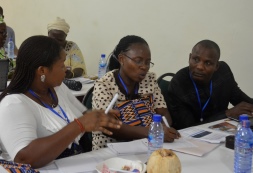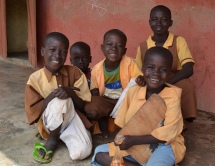From June 10 - 20 the Government of Ghana hosted the 9th African School Health and Nutrition (SHN) Course where representatives from ministries of health, education, agriculture, gender and social development, SHN experts, civil society and academics representing 12 African countries gathered to focus on best practice in SHN interventions.
The course was co-organised by Partnership for Child Development, West African Centre for International Parasite Control (WACIPAC) of the Noguchi Memorial Institute for Medical Research, and Eastern and Southern Africa Centre of International Parasitic Control (ESACIPAC).
Dr. Irene Ayi, Head of WACIPAC and the WACIPAC’s Department of Parasitology said,
"The SHN Short Course has over the years grown from strength to strength, providing an opportunity for ideas and experience exchange among policy and programme managers involved in school health and school feeding interventions from the various countries in attendance. Such interventions have been shown to improve the health and academic performance of school-age children".
Impact of School Health and Nutrition Interventions

Current perspectives on effective education reinforce that quality education is achieved through not only the provision of quality teachers, curriculum and materials but by supporting children’s health and wellbeing to be "˜fit to learn’.
A growing body of evidence also highlights the long-term and far-reaching negative consequences of poor health outcomes for school-age children on the broader education system, achievements later in life, and national and regional economies.
Comprehensive SHN programmes address challenges which negatively impact on child health, and such interventions include HIV/AIDS prevention, malaria and parasitic worm treatment, control and prevention, and nutritional deficiencies such as iron-deficient anaemia and short-term hunger through school feeding.
Course Focus
Throughout the short course, participants attended hands-on planning workshops and heard from experts in their fields deliver lectures exploring SHN themes, with particular focus paid to the theme of Nutrition in the School-Age Child and Adolescents.
Opening the course a keynote panel including Sir Roy Anderson, Director of the London Centre for Neglected Tropical Disease (NTD) Research and Professor Donald Bundy, Lead Health and Education Specialist at the World Bank discussed current SHN perspectives on child health and infectious disease and school feeding.
The Local Context

The course, which was held in Elmina, Ghana also gave participants the opportunity to learn from the Ghanaian context and the Ghana School Feeding Programme (GSFP), particularly on the eighth day of the course where attendees participated in school and teacher training college visits.
Appropriately designed school feeding programmes such as the GSFP have been shown to increase access to education and learning, and improve children’s health and nutrition, especially when integrated into comprehensive school health and nutrition programmes.
The GSFP, supported by PCD, sources school meals from local farmers and integrates components including deworming children from parasitic worms, ration design for nutritious school meals and assessing child behavioural change. At the same time the GSFP which sources school meals from local farmers provides them with a regular and reliable income by investing in the use of locally-produced food for school feeding.
Short Course Links

